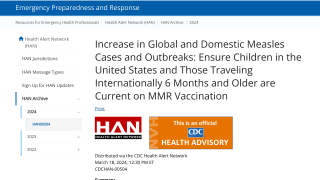Twin Cities Measles Outbreaks Can Be Eliminate With Vaccines

Public health officials announced that measles was officially eliminated from the United States in 2000 and is no longer an active health risk.
The U.S. Centers for Disease Control and Prevention (CDC) says this significant achievement demonstrated how effective vaccine policies can reduce contagious diseases. Most new cases in the U.S. can be traced to unvaccinated, infected individuals who brought the virus into the country.
For example, recent measles outbreaks in cities such as Chicago (64) and Minneapolis (40) have been traced to unvaccinated communities.
The Minnesota Department of Health (MDH) reported on September 5, 2024, that a measles outbreak began in May 2024. It is primarily affecting unvaccinated children in the Twin Cities metro area.
"Measles is currently circulating, and infections can be severe," said Dr. Ruth Lynfield, state epidemiologist and medical director at the MDH, in a press release. "I urge all parents to ensure their children are vaccinated because we know that vaccination offers the best protection."
Unfortunately, these measles outbreaks may continue in 2024.
The CDC reports that measles vaccine coverage has dropped over the past few years. It has fallen below the 95% target among kindergarteners and is declining in some areas.
This negative trend is one reason for the recent surge in measles cases.
Nationwide, the CDC's most recent report indicates 29 communities have reported 247 measles cases this year, the most since 2019. Last year, there were 59 measles cases in 20 U.S. jurisdictions.
"While parents may not be able to protect their kids from all the risks that come with childhood, you can protect your child from measles. The measles-mumps-rubella (MMR) vaccine is extremely effective at protecting kids, families, and the entire community," commented Dr. Abdul Abdi, a pediatrician at Children's Minnesota.
Globally, the CDC identified 56 countries reporting measles cases in 2024.
These data indicate the best way to reduce measles cases in the U.S. is to encourage international travelers to be vaccinated.
While on a long airplane flight, the measles virus can live for up to two hours in an airspace or on a surface after an infected person leaves an area. If other people breathe the contaminated air or touch the infected surface, then touch their eyes, noses, or mouths, they can become infected.
In the reissued Level 1—Practice Usual Precautions, Travel Health Advisory, the CDC stated that as of August 20, 2024, all international travelers should be fully vaccinated against measles with the MMR vaccine, including an early infant dose.
Various MMR and other travel vaccines are generally available at travel clinics in the U.S., and they are best administered one month before traveling to a country with a disease outbreak.
Our Trust Standards: Medical Advisory Committee





